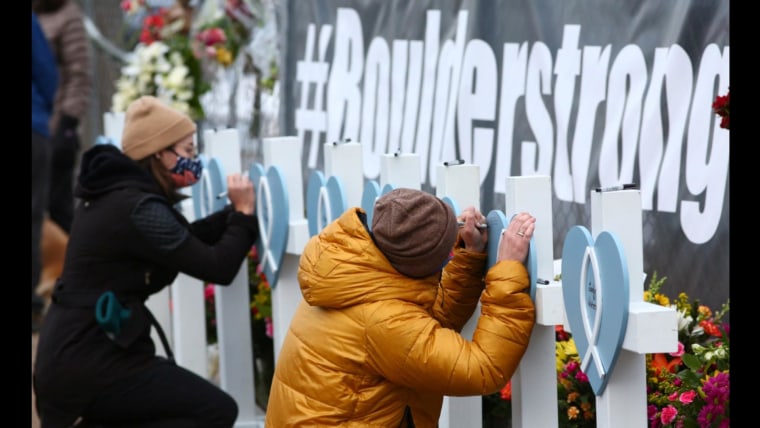Colorado residents are once again shocked and heartbroken and struggling to understand why mass shootings keep happening in their state.
On Monday, a gunman killed 10 people at a Boulder grocery store. The victims, including a police officer who responded to the scene, were ages 20 to 65. A 21-year-old man has been charged with 10 counts of first-degree murder.
Boulder, a calm, "beautiful college town," is "not the place you would think of gun violence," said Rep. Diana DeGette, D-Colo.
"We're just feeling like we've had a disproportionate amount of gun violence," DeGette said Tuesday on MSNBC. "As someone who has been active on gun safety legislation, it just leaves me reeling that this is something that could happen again here in Colorado."
Colorado ranked fifth in the country for most mass shootings since 1999 in a 2019 analysis by The Denver Post. Several of the shootings have occurred over a relatively small area, including Aurora, the site of a 2012 movie theater rampage that left 12 people dead and dozens more injured, and Littleton, where two high school seniors killed 12 classmates and a teacher and injured 21 other people at Columbine High School in 1999.
Other high-profile mass shootings include a 2007 attack on two churches in Colorado Springs and Arvada and a 2017 shooting at a Walmart Supercenter in the Denver suburb of Thornton.
The suspect in Monday's shooting lived in Arvada, police said.
Experts are divided over why Colorado appears to have a disproportionate share of mass shootings, but contributing factors include a contagion effect stemming from Columbine and easy access to firearms, they say.
"There's a combination of déjà vu and a learned helplessness, because these problems feel so predictable and preventable," said Dr. Jonathan Metzl, director of the Department of Medicine, Health, and Society at Vanderbilt University in Nashville, Tennessee. "One of the key factors in all these stories is how easy it was for people to get guns."
The suspect in Monday's shooting, Ahmad Al Aliwi Alissa, bought a Ruger AR-556 on March 16, according to an arrest warrant affidavit. Court documents did not identify the weapon used in Monday's shooting; witnesses described the killer as using an AR-style weapon, the affidavit said.
James Holmes, who was behind the Aurora shooting, bought his weapons legally in the months leading up to his attack. The Columbine shooters bought their firearms from a friend, who had purchased the weapons legally at a gun show.
Monday's mass killing came 10 days after a judge blocked a ban on assault rifles that the city of Boulder passed in 2018, The Associated Press reported. The ordinance and another banning large-capacity magazines were passed in response to a 2018 mass shooting at Marjory Stoneman Douglas High School in Parkland, Florida, where 17 people were killed.
"Right now it's a lot easier to get an AR-15 in many parts of the country than it was even after Sandy Hook," Metzl said, referring to the 2012 mass shooting at Sandy Hook Elementary School in Newtown, Connecticut, where 20 children and six adults were killed. "In a way, we've made it easier for mass shooters."
According to a 2016 study by Adam Lankford, a criminology professor at the University of Alabama, mass shootings are more likely to happen in places where gun ownership is common.
He looked at 171 countries and concluded that the U.S. and other countries with high firearm ownership rates are "particularly susceptible to future public mass shootings," even if they are otherwise peaceful.
"It's not countries with the most murders or the most suicides," he said. "It's the countries with the most firearms that had most mass shootings."
Experts also point to two of the most "iconic" mass shootings in history, both of which took place in Colorado, as reasons Colorado appears to have more public shootings.
The Columbine High School massacre became a cultural phenomenon not just because of the atrocities that happened there but also because of the shooters, whose black trench coats and reputations as outsiders captured the public imagination.
Similarly, the Aurora shooting was centered on a midnight screening of "The Dark Knight," a "Batman" sequel based on a mentally unstable, violent and now-ubiquitous Joker.
The shootings became cultural fodder, fueling a media frenzy that put the killers center stage, said Frank Farley, a psychology professor at Temple University in Philadelphia who is a former president of the American Psychological Association.
"It stood out among other violent acts in America," he said. "It even set the stage, perhaps."
While it is natural to look for patterns when tragedy strikes, Farley also warned against "confirmation bias," or the tendency to interpret evidence as confirmation of existing beliefs or theories.
"We always have to watch out for that bias," he said. "You think there could be something funny about Colorado, and therefore you see things where you might not have noticed them before."
"how" - Google News
March 24, 2021 at 03:31PM
https://ift.tt/3d12QQW
How does this keep happening here? Colorado residents ask themselves after another mass shooting - NBC News
"how" - Google News
https://ift.tt/2MfXd3I
Bagikan Berita Ini















0 Response to "How does this keep happening here? Colorado residents ask themselves after another mass shooting - NBC News"
Post a Comment